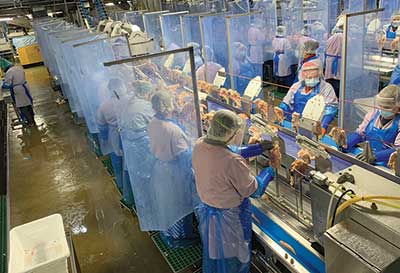Local 88 plants cut and package the meat; meat cutters in the news work in plants with a ‘kill floor’
By MARY ANN O’TOOLE HOLLEY
Correspondent

About six weeks before Smithfield Meats closed its South Dakota plant over massive numbers of workers testing positive to Coronavirus exposure, workers asked the company to implement safety measures like checking temperatures and staggering lunch schedules for employees, says Kooper Caraway, president of the local arm of the AFL-CIO, which is assisting plant employees.
“The management did not take the workers’ demands seriously and did not implement any of the procedures,” he says. “It wasn’t until dozens of workers tested positive that the management decided to implement these things, but by then it was too late.”
United Food and Commercial Workers Local 88 Meat Cutters Business Manager Dan Telle says that’s not the case with meat cutters represented in our area.
 Telle said Local 88 represents three plants in Missouri: Kuna Meat, PFG Middendorf and U.S. Foods, with about 150 to 200 members maximum, as well as meat cutters in the area union grocery stores. He said no cases of COVID-19 have been diagnosed among Local 88 members.
Telle said Local 88 represents three plants in Missouri: Kuna Meat, PFG Middendorf and U.S. Foods, with about 150 to 200 members maximum, as well as meat cutters in the area union grocery stores. He said no cases of COVID-19 have been diagnosed among Local 88 members.
Telle said the Local 88 plants process meats, while those meatpackers you see on the news have a “kill floor” and basically prepare the primal cuts. Local 88 plants cut and package the meat items.
“I’m surprised there has been no diagnosis of exposure in our plants. I’d like to think maybe it’s because we have a close eye on them,” Telle said. “Through our International we received guidelines, and went into the into the plants and grocery stories and went through a checklist. We’re making sure that the companies are doing all they can to help employees and keep them safe. Maybe (such good results are because) it’s the threat of the union.”
Telle said the Local 88 plants cut beef, lamb and pork. They get it shipped to them and they do portion control, like if a restaurant has an order for 800 8 oz. strip steaks. In the grocery stores it’s varying weights. In the packing industry everything is an exact weight.
CONTRACT TALKS ON HOLD
Meat Cutters Local 88 were three months into contract negotiations for its membership when the COVID-19 pandemic hit. Now, Telle said, although talks continue, formal negotiations are closed.
“We have postponed formal negotiations for now, but when we return and meet, I believe the companies want to be done,” Telle said. “Three months of negotiations, but then COVID came, and our worthless governor didn’t feel like giving grocery workers and meat cutters first responder status as they put their face on the line. They’re exposed to hundreds of people every day, and the governor still won’t recognize their value.”
More than 70 percent of the beef and 60 percent of the pork consumed in the United States is processed in meat packing plants represented by UFCW members.
“These workers never signed up to be first responders in an emergency, but that is exactly what they are now, and they need protections immediately before more lives are needlessly lost,” said UFCW International President Marc Perrone. “The human cost to America’s food, retail, and commercial workers is real and growing.”
LAID-OFF MEMBERS BEING BROUGHT BACK
Telle said a few members had been laid off but most are being brought back now that restaurants are opening again.
“We’ve been able to take care of all of our people,” Telle said. “There were a few people who got laid-off in our plants, but they’re bringing them back now with restaurants opening up. Most of those who were laid off were able to help in the grocery stores.”
IN RETROSPECT
The Smithfield plant was accused in a lawsuit of failing to adequately protect workers at a Missouri plant who have been forced to work “shoulder to shoulder” during the coronavirus pandemic.
Virginia-based Smithfield, owned by China’s WH Group, would not say how many Illinois employees were infected with coronavirus.
The lawsuit, filed in Missouri federal court, claims Smithfield created a “public nuisance” by providing inadequate protective equipment to workers at the plant in the town of Milan, refusing to give them time to wash their hands and discouraging workers who were ill from taking sick leave.
Workers have also been disciplined for covering their mouths while coughing or sneezing, because it could cause them to miss pieces of meat coming down the processing line, according to the complaint.

